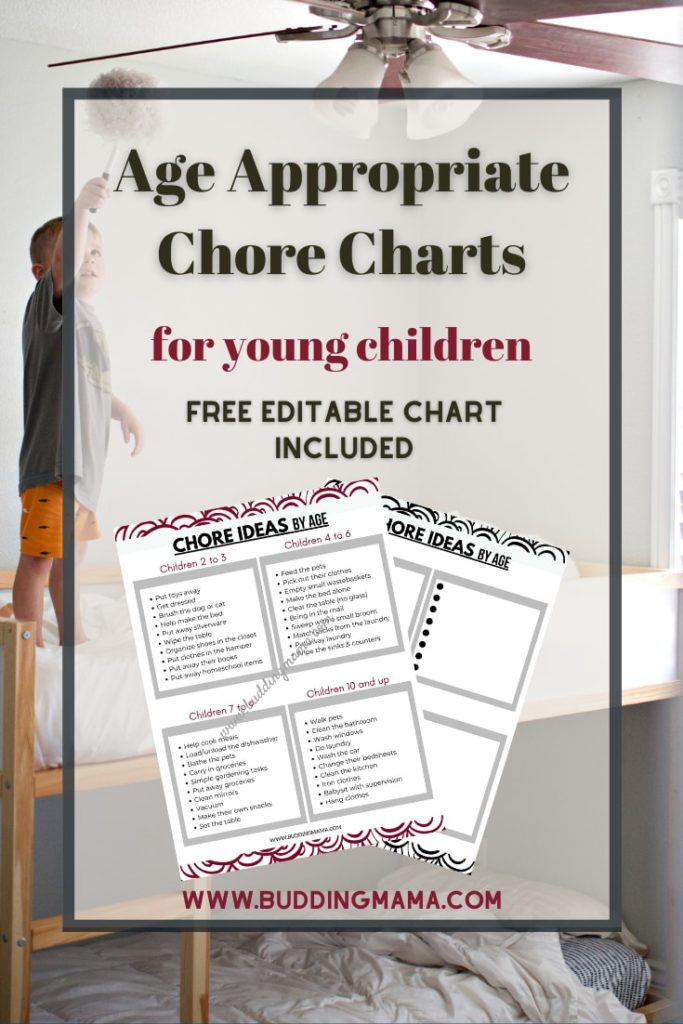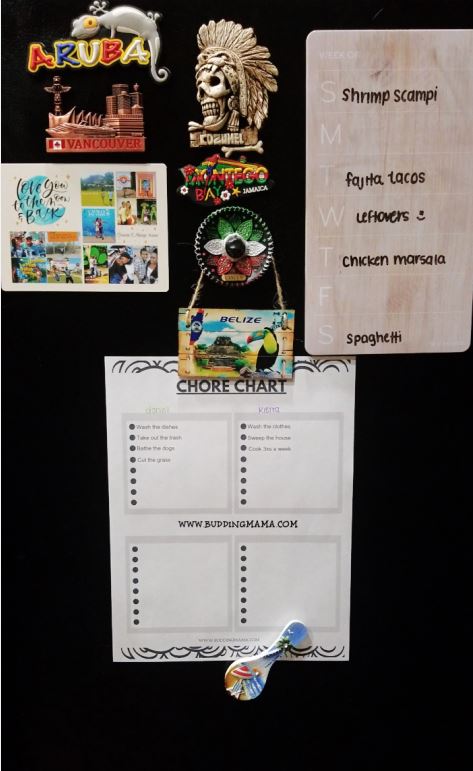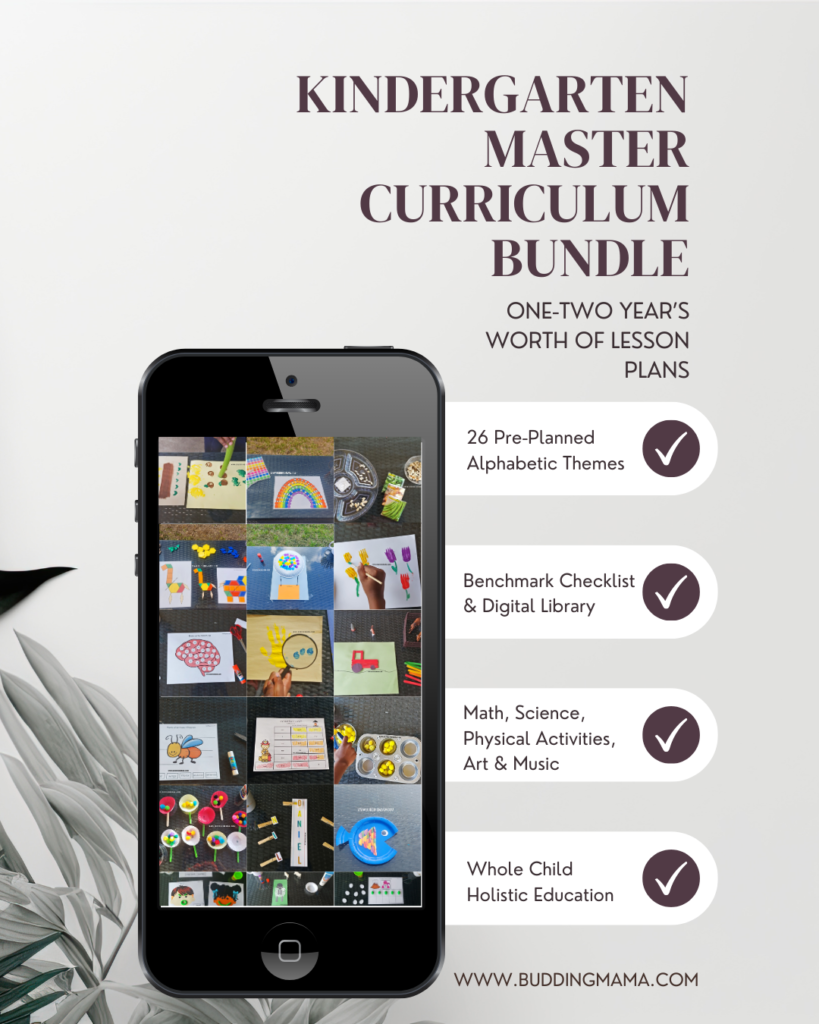It’s March and we are a few months into our New Year’s Resolutions and all the changes we want to make for our family.
Almost every person creates some type of home organization resolution for themselves in the new year, especially moms. Even if you didn’t make a resolution we all know maintaining a household especially with little ones can seem near impossible.
It’s time to change that.
Assigning chores to young children as early as 2 years old can bring about many benefits that will impact them as they grow.

The American Academy of Child and Adolescent Psychiatry pinpoints that “children who do chores may exhibit higher self-esteem, be more responsible, and be better equipped to deal with frustration, adversity, and delayed gratification. These skills can lead to greater success in school and relationships.”
When setting chores for your little ones you want to think about what is reasonably suitable for them. Different chores make sense for different ages, but you also know what is best for your child.
Don’t shy away from responsibilities you feel may present a challenge as well as not overwhelming your child with chores that they may not be ready for.
What about you?
As you set up age-appropriate chores for your little ones, you can find some cleaning hacks for you that will make your own cleaning routines faster and easier.
You can get all the tips and the daily, weekly, and monthly checklists by checking out this blog post.
Setting the Chores:
First things first, when giving chores to younger children you must create reliable habits. There are some important behaviors you want to practice as the parent and behaviors you will want to help your little one practice.
For yourself:
- Maintain a Daily Routine– Add chores into their normal day to day routine. So, wake up, make the bed then start getting dressed for the day. Chore #1…check.
- Be Consistent-One of the biggest mistakes a parent can make when setting chores is being inconsistent. If you set up a chore routine follow through on when they need to be done. If they aren’t done before bedtime that is the time to complete them. If you promise a reward be sure to set a date and do it when you promised.
- Create a Rewards System-While, the benefit of chores will happen naturally. You will face some push back because they will not always want to do them. Think about it do you always want to clean up? Offering rewards gives them something to look forward to for being responsible.
- Talk About Your Expectations-Communicating with your child no matter their age is critical to their decision-making. When implementing a new chores system talk to them about-the chores they will be doing, what needs to be done for chores to be considered complete, what types of rewards you are offering (if any), and when they would receive their rewards or breaks.

For your children:
- Scheduled Chore Time-All children should have some sort of daily routine to maximize productivity and enjoyment for the entire family. Try to add their chore time into their daily routine that way they know when to expect it plus it set the standard for the day.
- Chore Options-While you can set the chores you feel they are able to do you want to try to make them something they don’t hate doing. Allowing some reasonable flexibility in the chores they have to do will help keep push-back to a minimum. For example, they MUST clean their own rooms and wash their own dishes, but they can pick between folding clothes or taking out the trash twice a week.
- Reward Options-Similar to letting them choose their chores. Make sure to ask them about what rewards they would like. It can be based on a rolling scale or just small rewards all around. You may know some of their desires, but they will try harder for something they truly want.
As you use the free editable printable chore chart templates you will want to try and incorporate these strategies to most effectively create an in-home chore routine your children won’t run from.
How-To Use the Chore Charts Printable:
Next, to help you transform your chore assigning methods I am including a free editable chore chart for you to use. It has up to 4 slots where you can assign different family members.
If you need more than 4 slots be sure to print a second copy.

- Download the printable using the button at the bottom of this post.
- Read over some of the chores that match the age groups.
- Fill in the printable with each person’s name and their chores.
- Print the chore chart and put it on display where everyone can see it (usually on the refrigerator).
If you prefer you can print the blank chart and then write in the chores yourself.
Teaching life skills while homeschooling is easier than you think and I have an entire year of curriculum planned out for you to make it happen!
The Kindergarten Curriculum Bundle includes practical lessons to incorporate life skills into your daily routine. You will find ideas like:
- 🍎 Setting the table and basic cooking as part of your daily routine.
- 👕 Folding clothes and cleaning up toys to build responsibility.
- 🌿 Gardening and caring for plants to connect with nature.
- 💵 Simple money lessons like counting coins and “playing store.”
- 🧽 Learning about hygiene with fun activities like handwashing songs.
The best part is they are designed seamlessly with 26 alphabetic themes to keep you organized.
Plus, the Kindergarten Curriculum features a whole theme dedicated to life skills, helping you guide your child through everything from household chores to understanding safety and community.
Ready to Master Teaching Life Skills? Easy Start, Big Results!
Reward Ideas:
One way to encourage your children as your start implementing chores is to offer rewards.
You can choose how often you want to offer rewards or whether some rewards weigh more than others. For instance, they can watch 30 minutes of extra TV but after a week of doing their chores without being pushed they can get a toy from the store.
A tiered reward system will allow them the opportunity to be rewarded in the short-term as well as show them the benefits of long-term dedication and hard work.

Some easy reward ideas are:
- A movie date
- Their choice of a new board game
- Swap out a chore for a week
- Stay up 30 minutes to an hour later
- Go to the park
- Fast food date
- Can get a treat or have candy
- Let them sleep in 15-30 minutes
- Take a vacation (month of chores completed)
- Go to the zoo
- Let them have a sleepover
Try to avoid rewarding chores with money unless previous money managing behaviors have been demonstrated.
You can come up with almost anything as long as it is something your child actually wants. Make sure the rewards are thought out ahead of time and that you tell your child what reward is to be expected if they follow through.
Offering a choice between two options always works best. For instance, if you do your chores for the entire week you can choose between going to the zoo or getting an extra hour of TV time.
Let’s teach kids skills that last a lifetime!
Continue building on those great skills with these other incredible resources:
Cleaning Routine Checklists for Moms– Do you have a cleaning routine for your home? These checklists will allow you the ability to plan out your chore routine to make the most of your time. You will find daily, weekly, and monthly cleaning ideas you can incorporate today.
Homeschool Organization & Decorating Checklists-While, you are ensuring you maintain a clean and beautiful home don’t forget about your homeschool learning area. No matter the size of your homeschool room [or table] these organization and decorating hacks will have you maximizing any space.
Download the printable by clicking the box below.
Last Updated on November 3, 2024 by Kierra

